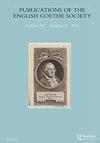‘Wir hätten keine Zukunft mehr?’ Hedwig Dohm’s Future-Orientated Ideas of Aging in Feminist Writings from the 1900s and her Short Story Werde, die du bist
IF 0.1
3区 文学
0 LITERATURE, GERMAN, DUTCH, SCANDINAVIAN
引用次数: 0
Abstract
Around 1900, the feminist Hedwig Dohm (1831–1919) drew attention to acts of silencing with respect to women in later years. Her essays, such as ‘Die alte Frau’ (1903) and ‘Mutter und Großmutter’ (1912), and her short story Werde, die du bist (1894) highlight how addressing the question of old age requires a transformation of attitudes towards the human. This essay draws on Simone de Beauvoir’s philosophy in The Coming of Age (La vieillesse, 1970) to explore the notion of age as a ‘cultural fact’ in relation to Hedwig Dohm’s critical engagement with the marginalization of women. Dohm’s writings — from her own later years — intervene to cast light on cultural double standards concerning a gendered life course; they also engage with the otherness of the body and reflect on ways of keeping the future open to alternative possibilities.我们不会有未来同志之夜第二季第一集
1900年左右,女权主义者海德薇格·多姆(1831-1919)引起了人们对后来对女性的沉默行为的关注。她的文章,如《老夫人》(1903)和《Mutter und Großmutter》(1912),以及她的短篇小说《Werde, Die du bist》(1894)强调了如何解决老年问题需要对人类态度的转变。本文借鉴西蒙娜·德·波伏娃在《年龄的到来》(La vieille, 1970)中的哲学思想,探讨年龄作为一种“文化事实”的概念,并将其与海德薇格·多姆对女性边缘化的批判性参与联系起来。多姆晚年的作品介入并揭示了有关性别人生历程的文化双重标准;他们还参与身体的他者性,并思考如何保持未来对其他可能性的开放。
本文章由计算机程序翻译,如有差异,请以英文原文为准。
求助全文
约1分钟内获得全文
求助全文
来源期刊

Publications of the English Goethe Society
LITERATURE, GERMAN, DUTCH, SCANDINAVIAN-
CiteScore
0.10
自引率
0.00%
发文量
15
 求助内容:
求助内容: 应助结果提醒方式:
应助结果提醒方式:


